Derek Schmitz's Blog
August 1, 2025
CV Update
Following today’s announcement of my acceptance into The University of Alabama at Birmingham, a new copy of my CV is available!
Check it out:
Schmitz Public Full CV_2508 (embedded, or click the file name to view)I’m a Blazer!
For as long as I’ve been alive, The University of Alabama at Birmingham (UAB) has been my second home. I was born there, receive my braces from their partner organizations, attended hundreds of physical and occupational therapy appointments, and been treated by the best team of physicians anyone could ever ask for.
And, now, I’m ecstatic to announce that, later this month, I will be continuing my post-secondary journey by becoming a UAB Blazer pursuing a Bachelor of Science in Medical Sociology, with a minor in Legal Affairs. This opportunity feels almost surreal, and I’m excited to be the one learning rather than being the one used to learn (by medical students etc.) for a change.

My interest in Medical Sociology seeks to explore and better understand human interactions and the impact of healthcare systems on disabled people. I hope to learn the forms and consequences of human interactions, as well as why social inequalities exist. I seek to explore, through qualitative and quantitative data analysis, how a person’s disabilities or other social factors impact their health and the healthcare they receive, as well as be able to identify how and where policy changes can be implemented to improve quality of life and healthcare access. UAB’s program is heavily research focused, and I’m looking forward to learning not only how to conduct research, but what to do after research is conducted.
In making these discoveries, I hope to build upon and increase my effectiveness both as an advocate and a legal professional. As an advocate, understanding how and why people are impacted by things outside their control, such as their disabilities, will allow me to best support them during times of hardship. As a legal professional, understanding how and why harmful legislation and policy are passed will allow me to craft creative, science-backed opposition to injustices in our world.
I can’t wait to get started.
July 21, 2025
Reflections on my Time at Gadsden State Community College
In May, I graduated with Magna Cum Laude honors in Paralegal studies from Gadsden State Community College. I feel honored to have learned in such a supportive program, and will be eternally grateful to all my instructors and advisors for sharing their knowledge with me over the past 2 years.


Each semester, I served as a member of the Gadsden State Paralegal Association, and in my final year, I was honored to have been selected to serve as President of the Association. As President, I was delighted to lead the Association to First Place in the Candy with the Cardinals booth contest. Our exceptional VP and advisor, as well as my classmates and other association members really stepped up for this event.
Throughout my time, I received numerous honors, for which I am grateful and proud of myself for earning. Honors I received included:
Fall 2023 Dean’s List MemberPhi Theta Kappa International College Honor Society InducteeSpring 2024 James L. Brown Scholarship RecipientSpring 2024 President’s List MemberSummer 2024 Dean’s List MemberFall 2024 Dean’s List MemberLambda Epsilon Chi Paralegal Honor Society InducteeSpring 2025 Student of DistinctionIn my final semester, I completed an internship with Disability Rights Maryland’s Developmental Disability and Healthcare team, where I was empowered to blend personal experience and legal knowledge to effectively assist clients.
At DRM, I:
Utilized the National Disability Rights Network Elevate platform to complete 3 continuing education coursesServed 131 hours over 60 working daysAttended 35 meetingsWorked 10 casesReviewed 3 legislative session hearings I delivered a presentation in front of my classmates and academic advisor regarding my exceptional experience at DRM, which allowed me to complete the academic requirements for my internship, as well as the Paralegal program as a whole.
I delivered a presentation in front of my classmates and academic advisor regarding my exceptional experience at DRM, which allowed me to complete the academic requirements for my internship, as well as the Paralegal program as a whole.I can’t wait for what’s next! Stay tuned for my announcement on August 1 about my next steps.
1754064000days
hours minutes seconds
until
Next Steps Announcement
June 11, 2025
Advocacy Alert: Comment by June 16 in Opposition of Department of Energy Accessibility Rule Changes
The Department of Energy currently has two “direct final rules” that will adversely affect disability rights. One of these rules removes regulations requiring new buildings to be accessible, and the other would remove accessibility requirements for older buildings and alterations to buildings. Further, the rules remove highly-specific language regarding accessibility requirements, called the Uniform Federal Accessibility Standards, from regulation.
“Direct final rules” (DFRs) are typically used when rule changes are routine and noncontroversial. These are anything but. If enough “significant adverse comments” are received on a rule designated as a DFR, the Department of Energy will provide notice in the Federal Register before July 15th either withdrawing the rule or issuing a new final rule which responds to significant adverse comments.
Our job is to submit those DFRs before 11:59 Eastern Time on June 16, 2025. The Disability Rights Education & Defense Fund has incredible resources, including templates and step-by-step directions on how to make a comment for these rule changes. You can view them here.
This is our time to take action. We cannot allow these changes to take effect silently.
My Submitted CommentsFILED_Schmitz_Public-Comment_DOE-HQ-2025-0024 (Click to open in new tab)FILED_Schmitz_Public-Comment_DOE-HQ-2025-0015 (Click to open in new tab)June 11, 2024
HHS Makes Groundbreaking Announcement on Long COVID Definition
Earlier today, while I was eating lunch, I got an email from the Health and Human Services Office of the Assistant Secretary for Health’s Office of Long COVID Research and Practice mailing list that was so exciting that I dropped my food.
A screengrab of the email follows (with alt text embedded):
![[Blue logo for the Office of the Assistant Secretary for Health, Office of Long COVID Research and Practice.]Healthcare providers, patients, advocates, and community members, Today we’re very excited to announce that a committee of the National Academies released a new report proposing a consensus definition for Long COVID based on findings reported in existing literature, as well as stakeholder and patient input. The lack of a clear and consistent definition for Long COVID has presented challenges for policymakers, researchers, public health professionals, clinicians, support services, and patients. The 2024 NASEM Long COVID Definition aims to promote consistency in diagnosis, aid awareness efforts, help patients access appropriate care, and harmonize research.Learn more about the new definition and the process to get us here on the project webpage. HHS is currently reviewing NASEM’s recommendations and proposed definition.Ian Simon, Ph.DDirector, Office of Long COVID Research and PracticeOffice of the Assistant Secretary for Health](https://i.gr-assets.com/images/S/compressed.photo.goodreads.com/hostedimages/1718390985i/35615377._SX540_.png)
The referenced committee webpage is here, and the general project webpage is here.
DisclaimerI took a look through some of the resources that the National Academies of Sciences, Engineering, and Medicine put out and wanted to share my takeaways as a patient advocate only, in a personal capacity.
None of the opinions in this piece are medical or legal advice, and I encourage you to take a read through what I did to form your own opinions.
The sources I reviewed were:
Examining the Working Definition for Long COVID (Project Webpage)NASEM Long COVID Definition HighlightsNASEM Long COVID Definition One PagerNASEM News Release: Federal Government, Clinicians, Employers, and Others Should Adopt New Definition for Long COVID to Aid in Consistent Diagnosis, Documentation, and TreatmentInfographic: Elements of the 2024 NASEM Long COVID DefinitionIn the two hours since I got the message, I haven’t had the time to skim the full 150+ page report, but it has been released as well and is available to read free here. You can also buy the pre-publication copy or preorder a paperback version through that link.
NASEM also hosted a webinar announcing the report’s release, which I wasn’t able to attend. A recording of the webcast is available here.
My TakeawaysThis is HUGE. Long COVID advocates have long fought for a uniform definition to assist doctors in making the correct diagnosis for Long COVID.
HHS, in the email above, is careful to note that they are in the reviewing phase of this research, and have not made a final decision on adoption (which will likely require a public comment period—stay tuned.) However, If HHS adopts the recommendations of the NASEM committee on this issue, there will be a science-backed, patient-included consensus definition for Long COVID. I believe it’s likely to be adopted, considering HHS was one of the requestors and financial sponsors of this research.
NASEM now defines Long COVID as “an infection-associated chronic condition that occurs after SARS-CoV-2 infection and is present for at least 3 months as a continuous, relapsing and remitting, or progressive disease state that affects one or more organ systems.”
They appear to make five basic criteria to identify LC:
Attribution to Infection: Can follow SARS-CoV-2 (COVID-19) infections of any severity, including asymptomatic. No laboratory confirmation or other proof of initial SARS-CoV-2 infection is required.Onset and Duration: Symptoms must be present for at least three months. Onset may be continuous from infection or be delayed following acute SARS-CoV-2 infection.The committee does not define a strict cutoff time after infection for diagnosis of symptoms as Long COVID.Symptoms: More than 200 symptoms and conditions were observed to be possible, including exacerbation of pre-existing conditions. Symptoms may be of any severity and resolve within months or persist over years. The committee gives examples of possible symptoms and conditions that may be part of Long COVID, but is very careful to note that the symptoms and conditions they mention are not required or exclusionary in the diagnosis of Long COVID.Equity: The committee recognizes that Long COVID may affect children and adults, regardless of health, disability, socioeconomic status, age, sex, gender, sexual orientation, race, ethnicity, or geographic location.This reinforces advocacy efforts to communicate that anyone may be affected by Long COVID.Functional Impairment: The committee notes that Long COVID can have profound emotional and physical impact and affect ability to work, attend school, take care of family, and practice self care.Again, and this cannot be overstated, this is a HUGE win for Long COVID advocates, patients, and caregivers. If adopted, this definition would:
set the stage for proper diagnosis; potentially expand eligibility for health services, insurance coverage, disability benefits, and school or workplace accommodations; andprovide a resource for the development of public awareness and education, especially for patients and their families and caregivers.Today is a great day. We should take a moment to revel in the fruits of our labor as advocates. But, tomorrow, the fight to get this adopted will begin. Thanks for reading.
June 8, 2024
Gov. Ivey’s Response to My Medicaid Expansion Letter
Last month, I wrote a Letter to Governor Kay Ivey Regarding Medicaid Expansion in Alabama. In it, I requested a response in writing in the mail. Today, I received it, and in the interest of transparency, I’m releasing it publicly (with my address information redacted, of course).
Response to Derek Schmitz from Governor Kay Ivey, dated June 6 and received June 8, 2024.Plain text version:
[Office of the Governor, Kay Ivey, State of Alabama letterhead with state seal]
[Redacted address information covered with a “COPY” stamp]
June 6, 2024
Dear Mr. Schmitz:
Thank you for contacting me regarding Medicaid expansion. As Governor, ensuring all Alabamians have access to quality health care is top priority of mine, and to this end, your input on the matter is very important to me.
As you likely know, the federal Patient Protection and Affordable Care Act (ACA), which became law in 2010, contains a provision that authorizes states to expand the number of individuals who are eligible for Medicaid and to pay for their coverage. Since being elected Governor, one of my primary considerations while evaluating Medicaid expansion has been – and remains – our state’s long-term ability to pay for the program.
Please know that Medicaid expansion in Alabama will continue to be a serious consideration of mine. Your taking the time to contact me about this important issue is greatly appreciated, and I will remain mindful of your comments.
Sincerely,
[Kay Ivey wet signature]
Kay Ivey
Governor
KI/hs
Do I believe she will be making any changes to her policies anytime soon? No. There’s still a lot more work to be done to fully convince her of the dire need to make a change.
But it was cool to see her (or, her typist, at least) acknowledge that I know what I’m talking about.
As always when I discuss this topic, I will again encourage donations to Alabama Arise, the organizers behind the Cover Alabama Coalition.
June 3, 2024
Transition Maine Summit Recap
Last week, I had the distinct privilege to speak to the attendees at the Maine Department of Education’s Transition Maine “I Belong” Youth Summit through my work at Derek Schmitz: Advocacy!
The atmosphere was vibrant and full of energy. It truly filled my heart with joy to see the faces of students taking in the endless possibilities of the future—a future they are free to define however they wish. It was also incredible to watch educators absorb the information to help their students.
I was honored, as the first keynote speaker, to help set the tone for the day. My speech, entitled “A Self-Advocate’s Guide to Transition,” focused on the importance of community and provided information and resources that are often lesser-known, like Vocational Rehabilitation and Centers for Independent Living. I also mentioned the phenomenal work of the folks at Generation Patient and Global Healthy Living Foundation/CreakyJoints as resources for these transitioning students.
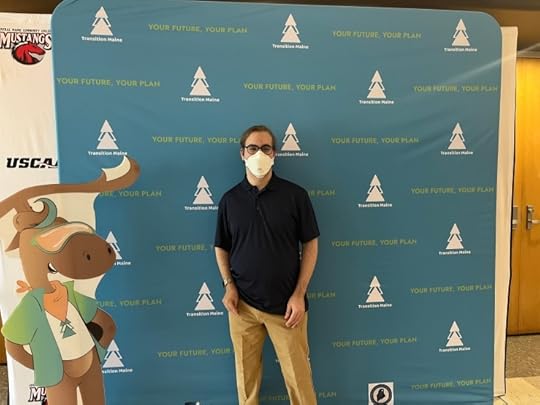
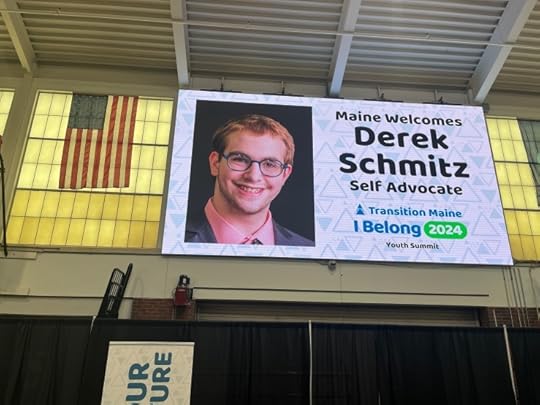
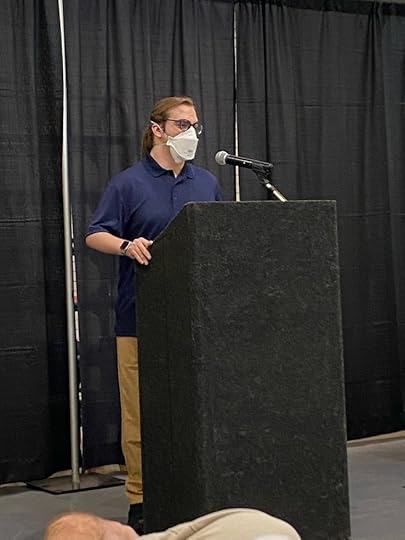
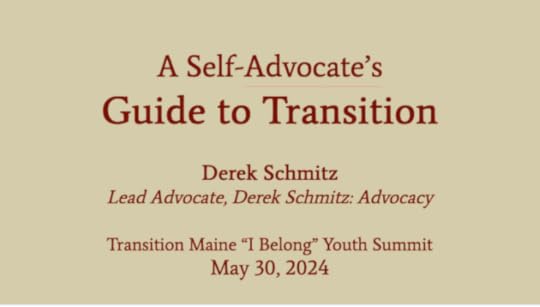

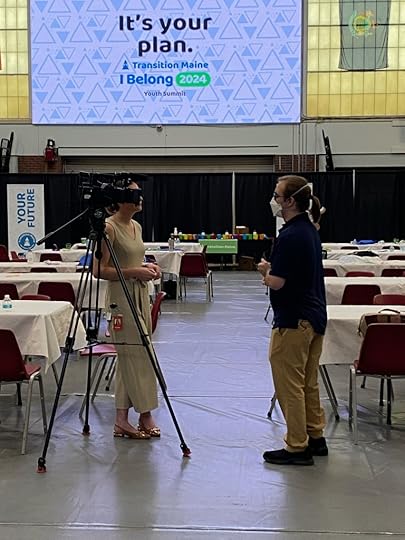
While at the event, I was interviewed by multimedia journalist Caroline LeCour and featured on NEWS CENTER Maine. The story I was quoted in is linked here.
This event was truly incredible and a one-of-a-kind experience I’ll never forget. Can’t wait to see what the Transition Maine team does next!
May 23, 2024
Letter to Governor Kay Ivey Regarding Medicaid Expansion in Alabama
Today, I sent a letter to Governor Ivey regarding Medicaid expansion in Alabama. I spent over two hours writing this 3-page letter yesterday, including research and implementable solutions to the issue of expansion.
I wanted to share it here as well to make my views on the issue public and encourage donations to Alabama Arise, the organizers behind the Cover Alabama Coalition.
May 22, 2024 Letter from Derek Schmitz to AL Governor Kay Ivey
View in a new tab here. Accessibility was verified for this PDF by the PDF Accessibility Validation Engine.
Plain text version:
[Maroon DS logo on the left of a beige header]
Derek Schmitz
[redacted address]
[redacted email]
[redacted phone number]
web: derekschmitz.com
May 23, 2024 via First Class Mail
The Honorable Kay Ivey
Governor of Alabama
State Capitol
600 Dexter Avenue
Montgomery, AL 36130
Dear Governor Ivey,
My name is Derek Schmitz, and I am a constituent in Calhoun County. I am a 19-year-old disabled
advocate and paralegal student. I am writing to you today to urge you to reconsider your position on
Medicaid expansion for our great state. Please reply to this letter in writing to my mailing address above.
On May 13, 2024, you were sent a letter1 by the nonpartisan Cover Alabama Coalition (the “Cover
Alabama letter”) reiterating the importance of quality, affordable healthcare for all Alabamians. This letter received support from eighty-five partner organizations and provided hard evidence that supported the expansion of Medicaid in the state. In a statement to Alabama Daily News, your communications director reiterated your concerns for “how the state would pay for it long-term.”2 The Cover Alabama letter directly addressed these concerns in a way I believed succinct enough to help assuage your concerns; however, since your “position is unchanged,”3 I thought hearing from a constituent directly affected by this issue and who works in this realm would be beneficial.
I had the privilege of previously working with the U.S. Department of Labor Office of Disability
Employment Policy (ODEP) in a role that allowed me to go deep into the trenches of state-level transition planning (from high school to the workforce/post-secondary education) for disabled youth. A key component in the transition process is ensuring that access to healthcare continues. When meeting with policymakers in states who have expanded Medicaid, I have discovered that providing access to healthcare helps disabled people, and all people, become and stay employed. It is unreasonable to expect someone to work when their basic needs are unmet, so states around the country are helping to meet those needs by providing healthcare. I urge you to do the same, as you hold the power to do so without a vote by the Alabama legislature.
Nearly 300,000 people4 (roughly 6% of Alabama’s population) fall into the Medicaid coverage gap. Three hundred thousand of your constituents are faced with two choices if they are ill: “don’t seek medical care or seek very expensive, very inefficient medical care through local hospital emergency departments.”5 That is, frankly, unacceptable, given your ability to change that with the swoop of a pen.
I will acknowledge that the expansion of Medicaid is an expensive and time-consuming endeavor. For
most of the last decade, the concern regarding the cost of expansion was valid.
However, times have changed. Having not expanded prior to 2021, Alabama is eligible for up to $624 million in FMAP funding as an incentive to expand Medicaid.6 Medicaid expansion costs would also be subsidized by the federal government’s FMAP coverage increase of 90% for expanded states,7 leaving the state share at only 10%.
I parrot the requests of the Cover Alabama letter by pleading for an Alabama solution to closing the
health coverage gap. Such a solution must:
● Cover adults with incomes between 0% and 138% of the federal poverty level.
● Support labor force participation by keeping workers healthy.
● Protect rural access to health care.
● Ensure access to all medically appropriate drugs.
● Minimize administrative barriers and red tape to obtaining health coverage.
● Increase insurance coverage across ethnic, racial, age and income groups.
● Maximize federal dollars to reduce state costs and ensure the long-term financial health
of Medicaid.
● Address wraparound services, including non-emergency medical transportation.
Should you wish to trial these changes before making a full commitment to them, the federal Section 1115 pilot program is available to provide five years to assess the impact, costs and sustainability of the
program. In 2020, Georgia was authorized to partially expand Medicaid through the pilot program. In granting their application,8 the Trump-appointed CMS Administrator wrote:
We are committed to supporting states that seek to test measures that are likely to increase coverage and improve the health of beneficiaries, and make them more financially independent, which in turn supports the fiscal sustainability of states’ Medicaid programs. We expect that such demonstration policies will improve beneficiaries’ physical and mental health, resulting in these beneficiaries consuming fewer health care services and resources while they are enrolled in Medicaid, which will preserve Medicaid program resources, make the Medicaid program more efficient, and potentially reduce the program’s national average annual cost per beneficiary of $7871.
Seema Verma, CMS Administrator (2017—2021)
If the State of Alabama were to make a similar application, I believe it would be granted, giving you and your Administration adequate time to fully test the hypothesis that expansion will be too expensive.
I hope this information helps you make the right decision for Alabamians and expand Medicaid.
Thank you for your time and attention to this sensitive matter. I look forward to hearing from and
partnering with you to ensure that all Alabamians have access to affordable, high-quality healthcare.
Respectfully,
[signature.png]
Derek Schmitz
Lead Advocate, Derek Schmitz Advocacy
Digitally signed at 2024/05/22 19:56:56
Endnotes
May 13, 2024 Cover Alabama Letterhttps://static1.squarespace.com/static/5e5d885fd1d06a5c284ecaf0/t/664378ab9d41d834ebb4d917
/1715697835928/Website+V ersion+May+2024+Cover+AL+letter+to+Gov+Ivey.pdfAL.com – Alabama Gov. Kay Ivey remains skeptical about Medicaid expansion, May 21, 2024
(paragraph 3)
https://www.al.com/news/2024/05/alabama-gov-kay-ivey-remains-skeptical-about-medicaid-expa
nsion.html?outputType=ampAL.com – Alabama Gov. Kay Ivey remains skeptical about Medicaid expansion, May 21, 2024
(paragraph 4)
https://www.al.com/news/2024/05/alabama-gov-kay-ivey-remains-skeptical-about-medicaid-expa
nsion.html?outputType=ampCommunity Catalyst – Analysis of Alabama Health Care Coverage Gaps Among Working People,
August 2023 https://communitycatalyst.org/resource/working-people-health-coverage-gaps/Comeback Town – Alabama paying the cost of Medicaid expansion but getting none of the benefits, March 21, 2023 (paragraph 3)
https://comebacktown.com/2023/03/21/alabama-paying-the-cost-of-medicaid-expansion-but-getting-none-of-the-benefits/Center on Budget and Policy Priorities – Medicaid Expansion: Frequently Asked Questions, March 18, 2024 (table 1)
https://www.cbpp.org/research/health/medicaid-expansion-frequently-asked-questions-0Public Affairs Research Council of Alabama – The Economic Impact of Expanding Medicaid in
Alabama, January 12, 2022 (paragraphs 6-7)
https://parcalabama.org/the-economic-impact-of-expanding-medicaid-in-alabama/October 15, 2020 Letter from CMS Administrator Seema V erma to Frank W. Berry, Commissioner, Georgia Department of Community Health (page 2)
https://www.medicaid.gov/Medicaid-CHIP-Program-Information/By-Topics/Waivers/1115/downl
oads/ga/ga-pathways-to-coverage-ca.pdf
May 1, 2024
Favorite Criminal Law Course Discussions
I just finished up with my Criminal Law class during my second semester of Paralegal schooling and wanted to share my favorite discussion posts from throughout the semester!
Please note that while the views expressed in these discussions are consistent with my beliefs, some feelings or beliefs may be toned down as these were originally submitted in an academic environment.
Week 5 Question: Do you think [probable cause] is a good and fair standard? Did the detective speaker offer you any insights into this standard? How do you think the standard could be changed, if you think that it should, and what issues do you see with it overall?
Week 5 Answer:
I believe that probable cause is a fair standard, however, I believe there should be a quantifiable standard to be met before it can be invoked, especially when dealing with traffic stops. An officer simply saying they smell something like weed or alcohol should not be enough to force someone from their car for a search. However, that suspicion plus verifiable (illegal) action should raise to the standard. As the current standard of probable cause is so broad, it may fall short of the Founder’s intentions to fully protect citizens from illegal searches.
Week 8 Question: What did you think about the Ted Talk in this week’s folder? Did you agree or disagree? Did you find merit in this argument? Would you add to or take away any of this information? Did anything particularly stand out to you?
Week 8 Answer:
I enjoyed the TED Talk this week, so much so that after watching it for the first time, I printed out and took notes on the transcript. Mr. Daniels shares a unique perspective on how activism can empower others to create change, something I strive to do every day. I found it particularly interesting when he noted that some of the prosecutors were unaware of the extent to which incarceration creates barriers for people, especially those who are already in a minority group (being a person of color, LGBT, etc). I applaud him for his work in further developing education for public servants regarding incarcerated people and was very enlightened by his talk.
Week 11 Question: Do YOU think [the cash bond system] is fair? Why or why not–or why are you not sure? What do you think could be done differently?
Week 11 Answer:
I believe the cash bond system is not fair and especially disparages marginalized people. Cash bonds serve as an easy pass for rich people to get out of jail and for bondsmen to get rich, while keeping those who are indigent or who cannot make bond inside the prison system. A person presumed innocent should not be held in jail solely because they cannot pay bail. If they are a community risk, I understand the remand to prison as a viable option. If safety is not a concern, I think a reasonable alternative to prison would be a release on one’s recognizance with the stipulation of GPS monitoring to ensure appearance.
Week 15 Question: What do you think about the trial by jury? Is it a good system? Do you think it works the way it is supposed to? In our more modern world today, can you offer any suggestions for ways to improve the trial process?
Week 15 Answer:
I believe trial by jury is the fairest tool we have in the justice system if it’s done right. Having people from a multitude of backgrounds, who don’t know each other, come together unanimously to decide someone’s fate is one of the highest standards out there.
I do believe sequestration should be standard though, as it is the only way to completely ensure there is no outside influence to the jury. When juries are instructed to disregard things or to only look at the evidence, they can’t just forget things. I think potential jurors should be briefed on the case and common terminology by the judge prior to the start of the case to help them be better informed.
Week 16 Question: Do you think the [justice] system is broken, and if so, do you have any suggestions to fix it?
Week 16 Answer:
Broken is a strong word, however, I believe there are many glaring flaws.
Chiefly in my mind is the cash bail/bond system. As I said in my previous discussion on the topic, bonds “serve as an easy pass for rich people to get out of jail and for bondsmen to get rich, while keeping those who are indigent or who cannot make bond inside the prison system. A person presumed innocent should not be held in jail solely because they cannot pay bail” (Schmitz, Week 11).
Additionally, even though efforts are made to prevent this, wrongful convictions do occur. A recent study published in the Journal of Quantitative Criminology estimated that “wrongful convictions occur in 6% of criminal convictions leading to imprisonment in an intake population of state prisoners” (Loeffler et al., 2018). Six percent may not sound like a lot, but if we figure that 1,000,000 people are incarcerated (Wisevoter, 2023), that means that 60,000 of them are wrongfully convicted across the United States.
These issues highlight the need for adequate defense attorneys (and paralegals) and changes to the system as a whole to make “justice for all” come true. Suggestions I have to fix these issues are to increase the number of people released on recognizance with GPS monitoring to ensure court appearances and to review all claims of wrongful conviction promptly. I’ve really enjoyed this class and can’t wait for next semester!
Sources:
Loeffler, C. E., Hyatt, J., & Ridgeway, G. (2018). Measuring self-reported wrongful convictions among prisoners. Journal of Quantitative Criminology, 35(2), 259–286. https://doi.org/10.1007/s10940-018-9381-1
Schmitz, D. (2024, March 24). Week 11 Discussion. Class discussion, Gadsden State Community College.
Wisevoter. (2023, June 22). Prison population by state 2023. https://wisevoter.com/state-rankings/prison-population-by-state/
Thanks for reading! While I’m on the topic, I am starting to look for a civil rights law firm in Alabama to host me as their Paralegal intern. Here is a copy of my full CV if you’d like to take a look, and please email jobsearch@derekschmitz.com with the Subject line: PI Information or click this link to open a new email with the address and subject line propogated.
April 20, 2024
Onward and Upward
This post is a mixed archive of posts from my public LinkedIn and private Facebook.
This week has been great, but also quite bittersweet.
On Tuesday, I had my last patient visit to Children’s of Alabama with the doctor and care team that I’ve been with since I was a baby. At the end of the appointment, my doctor stood, shook my hand, and commended me for the work I do as an advocate. I’ll still be part of the Children’s family, especially as I continue my work with Extra Life, the streaming-based donation platform that I donate my time to, but it was striking that I’m no longer a patient.
 Alt. text embedded – Taken 04/16/24 by me
Alt. text embedded – Taken 04/16/24 by meThen, on Wednesday, I was honored to be presented with the James L. Brown Free Enterprise Scholarship at the Gadsden State Community College Wallace Drive Honor’s Day Ceremony by Elizabeth McGlaughn. I received the scholarship as a result of the work I do as an advocate through Derek Schmitz: Advocacy.
I never considered that my advocacy, what I thought to be just a “thing” I did, was a business venture worth recognition. I often say that advocacy is an exhausting profession with lackluster recognition, as we are often the unnamed people who get the balls rolling to effect change. It felt amazing to be recognized for the work I put in. Thank you again to Elizabeth McGlaughn, Catherine Bailey, Pamela Curry, and countless others for always believing in me and encouraging me to keep going.
Also on Wednesday, I was formally inducted into Phi Theta Kappa Honor Society as a member of the Rho Rho Chapter by Ms. Melissa Davis and finalized my Paralegal Student Membership with the American Bar Association.
 Alt. text embedded – Taken 04/17/24, photo courtesy of Gadsden State Community College, Flickr
Alt. text embedded – Taken 04/17/24, photo courtesy of Gadsden State Community College, Flickr Alt. text embedded – Taken 04/17/24 by Shirley Schmitz
Alt. text embedded – Taken 04/17/24 by Shirley SchmitzOn the heels of these achievements, I proudly released an updated copy of my CV as I prepare to begin seeking out Paralegal internships for the Spring of 2025. I would be honored to join your team.
I’m so grateful for all of the opportunities I’ve been presented with, especially considering my parents were told I’d never walk or talk when I was born. Onward and upward!



